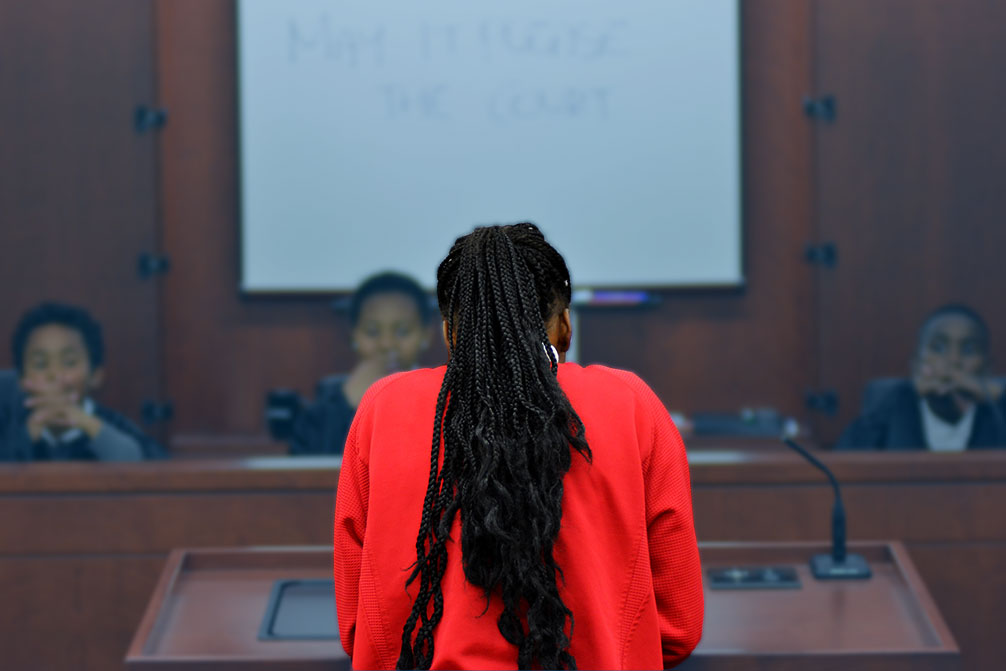Three GW Law students stood in front of a group of more than 20 rambunctious D.C. middle schoolers, all of who were nearing the end of another school day. Without hesitation, 3L Jude Nwaokobia and 1Ls Gil McDonald and Tasha Pulvermacher gathered the class's attention and jumped into a lesson about the evolution of U.S. voting rights.
Mr. Nwaokobia, Mr. McDonald, and Ms. Pulvermacher came to the School Without Walls at Francis-Stevens in Foggy Bottom as members of Street Law, a GW Law student organization that teaches youth in the District. Law students go to the middle school every other week during the semester to help local schoolchildren learn about the American justice system, their own legal rights and civic responsibilities, and the roles they play in their communities.
On this day, the law students split the class into three groups to discuss a question that the middle schoolers found personally relevant: should the U.S. lower the voting age? McDonald and Pulvermacher helped prepare two of the groups to argue the sides of the issue while Nwaokobia readied the third group to ask probing questions and judge the arguments.
Teaching the students how to construct and present arguments is one of the most important parts of the Street Law classroom lessons. "The kids love the program. They're learning how to do the research and then debate in a positive way," said CeCe Ogunshakin, a D.C. Public School teacher who oversees the Street Law visits.
Validating Ms. Ogunshakin, the students improved their arguments over the course of the day's lesson. Early on, one group relied on an example about a teenage cousin who was "definitely not ready to vote," but by the end of the class the same students had raised important points about the influence of parents on dependent voters and the age restrictions of other notable civic choices such as military service.
(Despite these points—and perhaps unsurprisingly—the judges still ruled in favor of lowering the voting age.)
At the end of November, the lessons culminated in a visit to the law school for a formal moot court argued and judged by the middle schoolers. A group of Street Law students helped guide the middle schoolers through the case's basic question, which asked if the First Amendment's promise of free speech covered the symbolic speech of public school students.
Just like in the classroom sessions, Street Law divided the students into sides and helped them reason through compelling arguments. Dressed in black robes, five student-judges then listened to the ideas of their classmates for a half-hour before deciding in favor of protecting the students' speech.
After the court handed down its decision, one middle schooler reflected on the practical knowledge she had gained in her time with GW Law students. "I like Street Law because it actually gives you an idea of what you might have to deal with when you get older," said MyAja Rush, a seventh grader. "Like if you find an issue and you don't really know how to address it, [learning] from Street Law I think will help us in knowing our rights when we get older, so that if we ever come across issues like the one we had today we'll know how to handle it."
Ari Cannon, a sixth grader, was already thinking about going to law school himself. "I think [Street Law] will help us in the future if we want to become a lawyer. It will help us to know our amendments," he said.
The middle schoolers are not the only ones who benefit from the program. "As someone who's new to D.C., it's a great way to get involved with the local community," Mr. McDonald said. "Also, teaching to these middle schoolers really tests your ability to take complex legal issues and distill them down to the essential elements. I've definitely improved at that since starting the program."
There are opportunities for GW Law students to get involved with Street Law each semester, both with the public school lessons and in a program with a juvenile detention center in D.C. Street Law volunteers choose their own level of involvement with the bi-weekly sessions, one-off events such as the on-campus moot courts, and occasional public interest programing.
Mr. Nwaokobia, the group's co-president, encourages anyone interested in joining to sign up. "Street Law is a fantastic group because it will enable you to contribute to the D.C. community," he said. "It takes you away from the stress of law school for a couple hours to serve the youth of our community. You get to work with fellow law students and talented youth. It is a great time."



